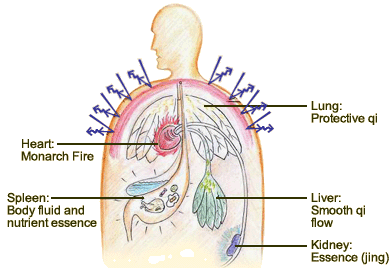The Material Basis of TCM Immunology: Zang Organs
The zang organs of TCM, which include the lungs, spleen, kidneys, liver and heart (also named as the five solid organs) are at the core of the immune activities. They combine with the tissues, viscera (organs), meridians, qi (vital energy), blood and body fluids, and form a unity. Unlike Western medicine, their physiological and pathological meanings are not entirely the same. Rather than a single anatomical structure, a zang organ is part of the overall dynamic energy process of the body. Healthy energy is closely associated with their physiology activities. They are the center of the whole immune process. Their collaborative jobs are to act as messengers, be responsible for transportation and storage, deal with excesses and wastes, control internal communication, make decisions and activate body functions.
 |
| In TCM, healthy energy (zheng qi) refers to the body's natural resistance against diseases and its repair ability, which is closely associated with the physiological activities of the five zang organs. |
Details for individual organs are outlined in the following:
1. The lungs are an immuno-barrier.
The lungs preside over qi (vital energy). They connect externally with the skin and hair and disseminate protective qi over the body's surface. The lungs' protective qi belongs to part of the healthy energy (zheng qi); because it forms the first barrier against the invasion of exogenous pathogens. The protective qi provides warmth and nourishment to the skin, subcutaneous tissues and muscles; it also controls the opening and closing of skin pores. When protective qi is abundant, muscles are smooth, skin is tender and subcutaneous tissues are firm. Therefore, the ability to resist external pathogens is ensured.
In this way, the lungs maintain the integrity of the body's outer barriers. Their actions are similar to the anatomical skin and mucosa linings such as that found in the mouth, which act like a natural immune barrier.
2. The spleen promotes immune functions.
In western physiology, the spleen is a large, vascular, lymphatic organ. However, in TCM, the spleen is regarded as the "acquired foundation of life", the source of blood and qi (vital energy) production. Actually, the spleen is a multi- functioning unit, which covers functions of the western anatomical spleen and pancreas and promotes activities of the digestive, endocrine, nervous and blood systems.
The spleen governs transportation and transformation of body fluids and nutrient essences and also controls blood flow. Although to a certain degree, the power of healthy energy is determined by congenital (inherited) factors, it is mostly dependent upon the nourishment of the spleen to keep it in regular supply. Therefore, the spleen determines the abundance and depletion of healthy energy. In turn, it assures bodily protection against diseases.

3. The kidneys are the basis of immune functions.
TCM views the kidneys as the "congenital foundation of life", the root of healthy energy. It governs congenital constitution and prosperity of the healthy energy. The stored kidney essence (jing) is the material basis for the entire body's yin and yang forces, which make the body's physical form and functions mutually restrict and depend on one another. Therefore, the kidneys play an important role in safeguarding the internal equilibrium. Moreover, abundance in kidney essence (jing) promotes vitality and functioning of protective-qi, thereby strengthening the body's resistance.
According to modern understanding, the TCM kidneys not only regulate the urinary system, they also exercise control over the reproductive, hematological, endocrine and nervous systems. They work closely with the neural-endocrine immune regulating network.
4. The liver helps to maintain normal immune activity.
From a TCM viewpoint, the liver is responsible for part of the functions of the endocrine, digestive, circulatory and immune systems. The liver promotes flowing and spreading movements. By stimulating flow, the liver adjusts and ensures the smooth movement of qi, blood and body fluids, and spreads these substances to the entire body. TCM believes that emotional activity is an outer manifestation of the physiological status of the internal organ system, which is considered the major internal cause for diseases (regarded as endogenous evils in extreme conditions). Normal emotional health depends on the harmony of qi and blood flow, and the liver is mainly in charge of this aspect. When the liver keeps everything flowing smoothly, a regulated internal environment is created keeping diseases out.
5. The heart regulates the immune activities.
The heart controls and regulates the flow of blood through the vessels of the body. It also rules the spirit, which in TCM, is the chief administrator of all the physiological and mental activities. Normally, the heart exerts its influence over other organs through the monarch-fire (heart fire) which cooperates with the prime-minister fire to promote the functional activities of other organs. When the heart's "ruling" is good, then the other organ systems work in harmony, and the body can fight against diseases effectively.
In addition to pumping blood, the heart possesses our Western understanding of the brain's role in regulating the nervous, cardiovascular and endocrine functions, because, the heart houses the spirit (shen). Since the heart plays a role in regulating nervous and endocrine functions, it naturally also plays a part in immune regulation.
Furthermore, the meridians are the pathways of qi and blood circulation as well as the channels where the immune functions take effect. The triple burner directs the various types of qi, and they act as the channel stations for the body fluids to circulate. They have an important effect on immune activities. |